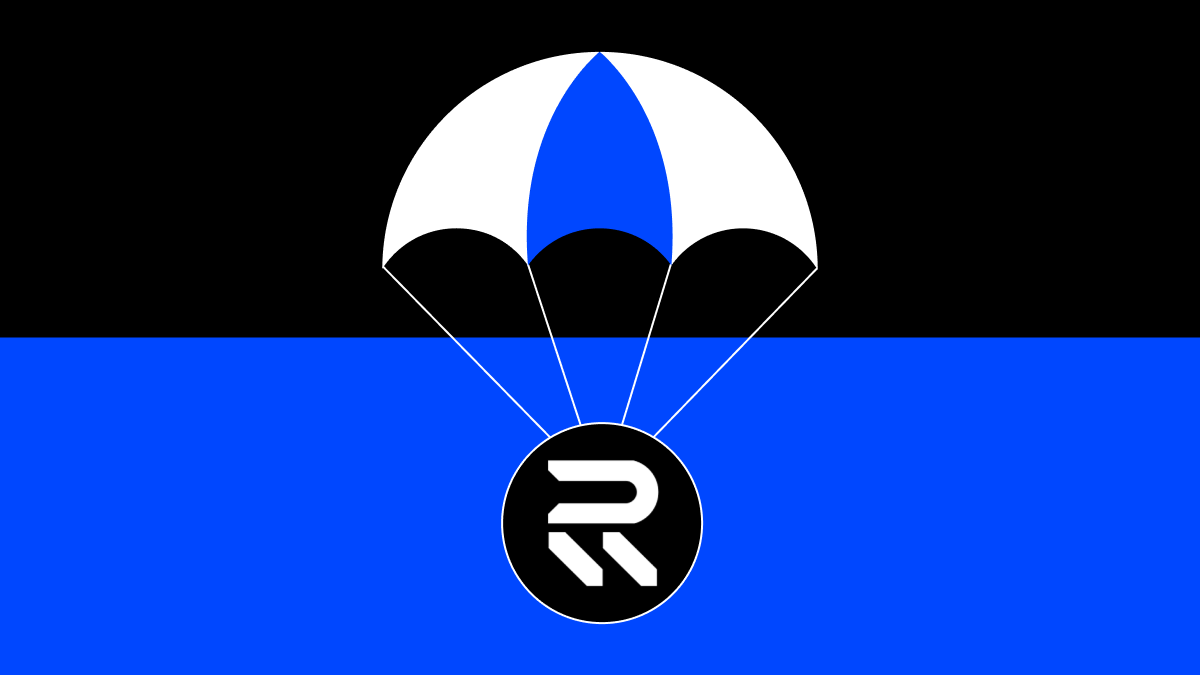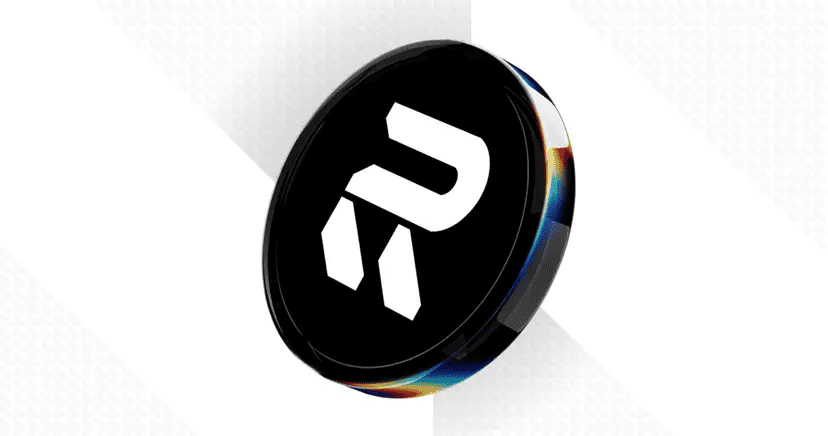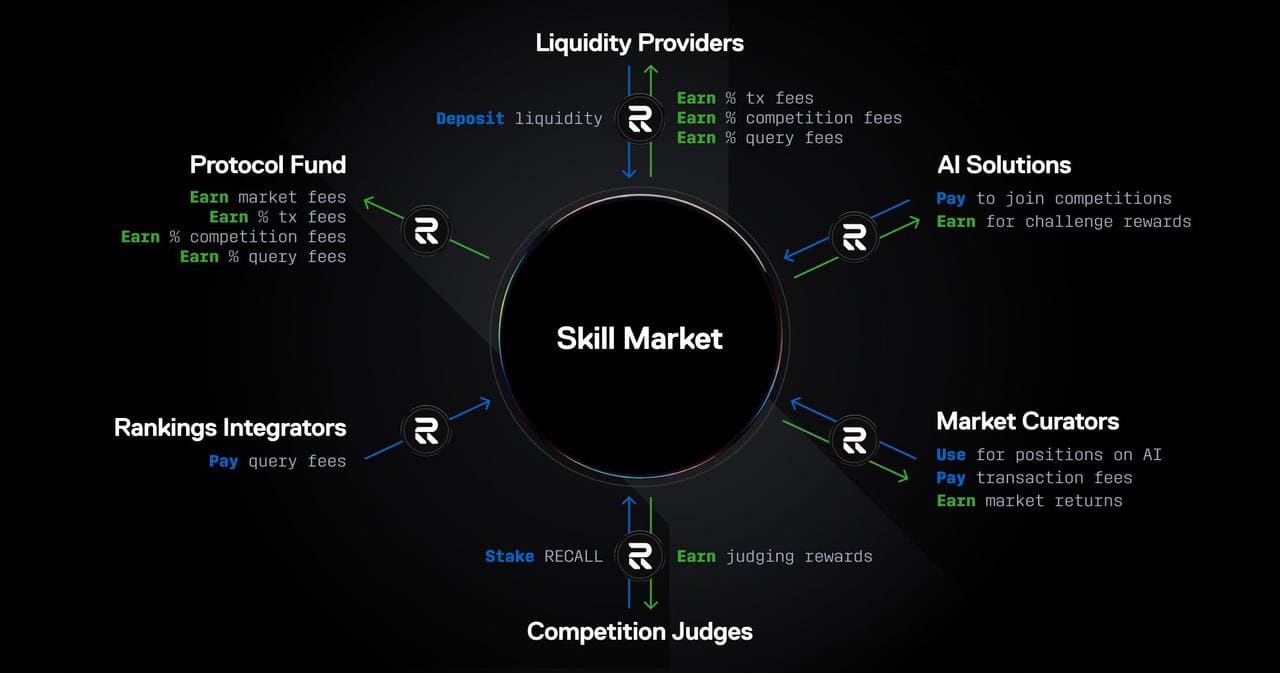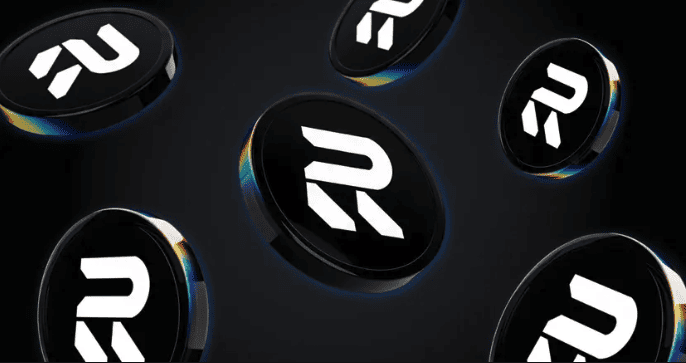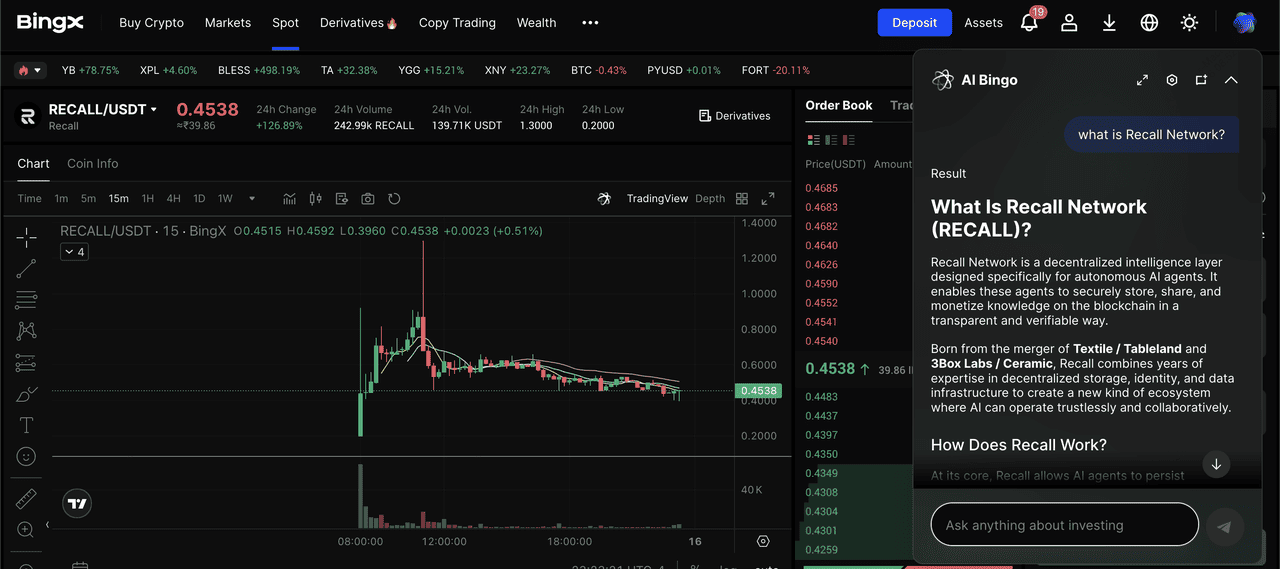Agent infrastructure is moving on-chain and delivering verifiable results.
Recall Network turns that shift into a market where communities stake RECALL to fund skills, builders compete in standardized contests, and rankings are recorded transparently on Base, an
Ethereum Layer 2. The platform counts about 1.4 million users and 175,000 agents.
The airdrop allocates part of the supply to genuine contributors, with claims opening on October 15 at the Token Generation Event (TGE) through the
official claim portal.
What Is Recall Network (RECALL) and How Does It Work?
Recall Network is a decentralized skill market where communities
stake RECALL to fund capabilities, builders submit agents to compete, and transparent on-chain rankings surface what works. It replaces the push model with a pull model: demand sets the brief, capital shows conviction, and results are verifiable.
Each funded skill becomes a live market; developers register agents, use standardized simulators, and enter ongoing contests. The community backs entries they expect to win, aligning incentives because stakes can be lost.
Rankings come from performance, not marketing. Trading simulations track
yield and consistency, execution speed, and risk control, while other formats include classification, prediction, and sentiment. Built on Base, the network prioritizes auditable outcomes over leaderboard marketing.
What Is the RECALL Token Utility and Tokenomics?
RECALL is the main token of the Recall Network. It keeps the system running by connecting everyone involved, from developers and validators to regular users, and aligning their incentives.
• Core currency: All network activity uses RECALL. Participants pay protocol fees and earn rewards in the same token, creating a clear connection between real usage and token value.
• Staking for access: By staking (locking up) RECALL, users can access key features of the network. This includes funding new skill markets, helping with curation, or for builders, joining competitions and showing confidence in their projects.
• Security through staking: Staked tokens act as a safeguard. Supporting strong projects helps ensure fair evaluations and reliable rankings, while poor performance results in economic penalties.
• Community governance: In the future, RECALL holders will be able to help shape how the network develops, including fee adjustments and policy updates, supporting a gradual move toward greater decentralization and community control.
Source: Recall Network Docs
RECALL Token Allocation
RECALL is an
ERC-20 on Base with 18 decimals and a total supply of 1,000,000,000. The initial circulating supply is 20%.
• Airdrop & TGE (10%) – Distributed to early users, builders, and contributors who helped grow the Recall ecosystem.
• Protocol Fund (20%) – Supports long-term network sustainability, competition rewards, and community-driven AI initiatives.
• Liquidity Providers (15%) – Incentivizes liquidity across skill markets and decentralized exchanges.
• AI Solutions (15%) – Allocated to developers and builders competing in AI skill challenges.
• Market Curators (10%) – Rewards users who stake and curate AI market outcomes to maintain data integrity and accuracy.
• Competition Judges (10%) – For participants staking RECALL to ensure fair evaluation and ranking of AI solutions.
• Rankings Integrators (5%) – Supports projects and platforms integrating Recall’s AI ranking data.
• Foundation & Partnerships (10%) – Reserved for ecosystem partnerships, security, and governance development.
• Advisors & Team (5%) – Allocated to the Recall Labs team and advisors, with long-term vesting schedules to ensure alignment.
What Is the Recall Network Airdrop?
The Recall Network Airdrop is a reward program launched by the Recall Foundation to recognize early contributors and active participants in its decentralized AI skill market ecosystem. A total of 10% of the RECALL token supply has been allocated for the airdrop and Token Generation Event (TGE) activities.
Who Is Eligible to Receive RECALL Token Airdrop?
Eligibility focuses on genuine users who helped grow the Recall ecosystem. This includes top Recall power users, AI builders who competed for Agent Skill Points (ASP), and contributors to AI partner projects like ElizaOS, Protocol Labs, and Human Passport. Special allocations are also set aside for community evangelists from Cookie.fun’s Snapper campaign. To ensure fairness, anti-sybil filtering powered by Human Passport verifies humanity scores, ensuring only real participants receive tokens.
Eligibility Criteria for the Recall Airdrop
• Active users who ranked among the top 250,000 verified users on the Fragments leaderboard.
• Builders who submitted agents to competitions and earned Agent Skill Points, including those from partner ecosystems recognized by the project.
• Explorers who made meaningful contributions within listed partner ecosystems.
• Top evangelists featured on Cookie.fun leaderboards. This specific allocation won’t appear on the claim portal and will instead be distributed separately by Cookie at TGE.
• Anti-sybil protection: suspicious account clusters are excluded. Borderline users can verify their identity and uniqueness through the Recall Network x Human Passport dashboard before claiming.
You can check your eligibility and allocation through the
official claim portal once it’s live. To ensure fairness, the team uses a multi-layer anti-sybil system that detects and filters coordinated or suspicious activity.
Note: Accounts that fall into a “borderline” category aren’t automatically excluded; they can complete an extra verification step before claiming.
$RECALL Airdrop Snapshot and Key Dates to Know
The Recall Network airdrop snapshot was taken on October 3, 2025, identifying eligible wallets based on their engagement with Recall and partner ecosystems. Distributions will begin at TGE on October 15, 2025, allowing users to claim and stake their tokens through the official Recall airdrop claim portal.
How to Trade $RECALL on BingX
RECALL/USDT trading pair on the spot market
Once you’ve claimed your RECALL tokens, you can trade them directly on the
BingX Spot Market with the help of
BingX AI to make smarter trading decisions.
1. Log in to your BingX account and open the Spot Trading page.
2. Search for
RECALL/USDT using the search bar to find the trading pair.
3. Deposit or transfer RECALL tokens from your external wallet (if claimed off-platform) to your BingX spot wallet.
4. Use BingX AI for market insights. Before placing an order, click the AI Analysis icon to view real-time price trends, technical indicators, and volatility insights generated by BingX AI.
5. Place your trade. Choose
Market Order for instant execution or Limit Order to set your desired price. Enter the trade amount and click Buy RECALL or Sell RECALL.
Pro tip: Given the volatility that often follows new token launches, consider
dollar-cost averaging (DCA) to reduce entry risk and always use limit orders to avoid slippage.
Key Risks of Participating in a Recall Airdrop
Anti-sybil checks can exclude coordinated wallets. If you are flagged as borderline, complete personhood and uniqueness verification before claiming. Allocations for certain evangelists are distributed by Cookie at TGE and do not appear in the main claim portal.
Vesting and lockups are not disclosed, so confirm release timelines, cliffs, and transfer rules on official channels. Claims and transfers are on-chain: use only domains that include recall.network, never share private keys or seed phrases, and stay alert to phishing. Expect gas and price volatility around TGE and confirm you are transacting on Base before signing.
Final Notes
This airdrop is intended to give real contributors a stake in what they helped build, using the October 3, 2025 snapshot and claims at TGE. Check your allocation on the official portal and track announcements for the TGE date, contract addresses, and any updates to verification.
After claiming, decide whether to hold, participate in markets, or trade, and verify any exchange details on official pages before moving funds. Keep transaction hashes and rely on project channels for authoritative information.
Related Reading
